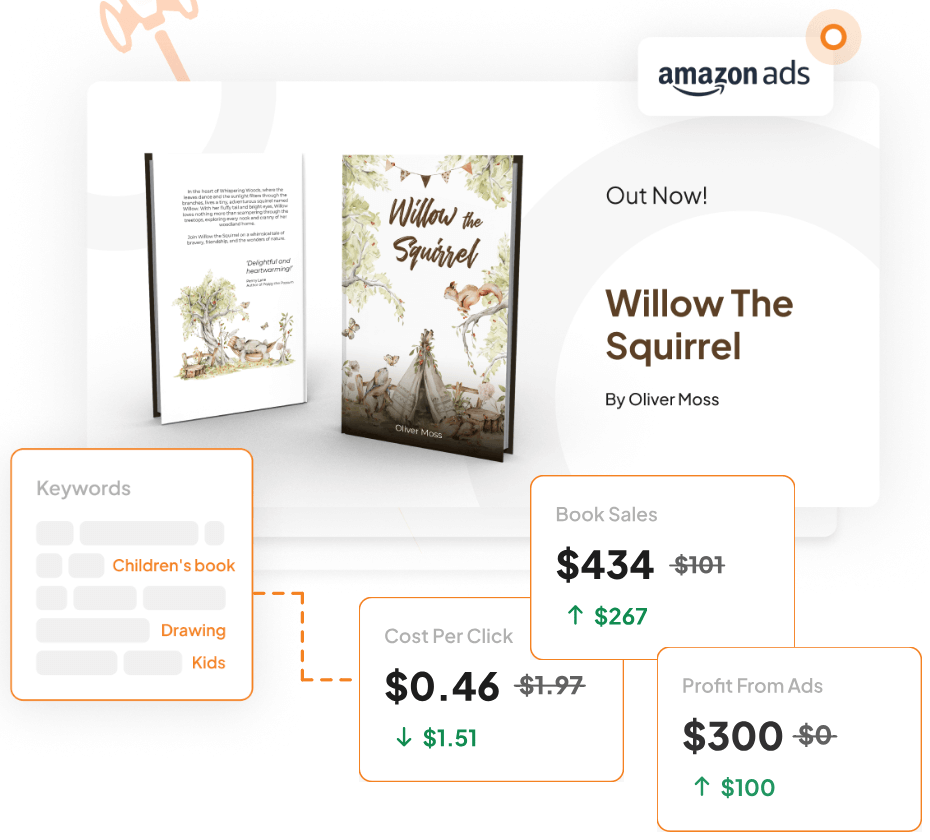Have you ever wondered what it takes to evolve from a solitary writer into a dynamic authorpreneur? In a world where the publishing landscape is as vast as an uncharted ocean, mastering the business of books is not just an option—it’s a necessity.
Today’s successful authors are those who have embraced their entrepreneurial spirit, navigating the complex tides of publishing with both creativity and strategy.
This journey requires more than just a pen and paper; it demands a mindset shift and a keen understanding of industry dynamics. Let’s embark on this transformative path, where words meet business acumen, and discover how you can thrive in the world of books.
Understanding the Authorpreneur Mindset
The concept of an authorpreneur is more than just a buzzword; it’s a revolutionary approach to the traditional writing career. But what exactly does it entail? At its core, an authorpreneur is a writer who actively engages in the business side of their craft, taking charge of their publishing destiny.
This role encompasses everything from marketing and sales to brand building and financial management. It’s about seeing oneself not just as a creator of stories but as a strategist in the business of books.
What is an Authorpreneur?
An authorpreneur is someone who understands that writing is both an art and a business. This hybrid role requires a balance between creative passion and commercial savvy.
An authorpreneur isn’t just waiting for the next book deal; they’re actively seeking opportunities to expand their reach and monetize their work. They are the architects of their own literary empire, using tools like self-publishing, digital marketing, and social media to forge a path to success.
To become a successful authorpreneur, start by building a strong foundation in both writing and business skills. Consider taking courses in marketing or entrepreneurship to broaden your knowledge.
Networking with other authors and industry professionals can provide valuable insights and support. Remember, being an authorpreneur means being proactive in all aspects of your career.
The Shift from Writer to Entrepreneur
Transitioning from a traditional writer to an authorpreneur involves a significant mindset shift. It requires embracing a more holistic view of your writing career, where each story is not just a creative endeavor but also a product with potential market value.
This shift can be daunting, but it’s also empowering. By adopting an entrepreneurial mindset, writers can take control of their publishing journey, exploring new avenues for income and growth.
One key aspect of this transition is learning to view yourself as a brand. This means understanding your unique voice and how it appeals to readers. It also involves strategic planning and setting clear goals for your writing career.
With the right mindset, you can transform challenges into opportunities and build a sustainable career in the publishing industry trends.
Navigating the Business of Books
The publishing industry is a multifaceted world, with its own set of rules and players. To navigate it successfully, aspiring authorpreneurs must familiarize themselves with its key components.
This involves understanding the roles of agents, editors, publishers, and distributors, as well as the various publishing models available today. Whether you’re considering traditional publishing, self-publishing, or a hybrid approach, knowing the ins and outs of the industry is crucial.

Key Components of the Publishing Industry
At the heart of the publishing world are several key players who each play a vital role in bringing a book to market. Agents help authors secure deals with publishers, while editors work to refine manuscripts to perfection.
Publishers manage the production, distribution, and promotion of books, ensuring they reach the intended audience. Distributors, on the other hand, are responsible for getting books into bookstores and online platforms.
For an authorpreneur, understanding these roles is essential. It allows you to make informed decisions about your publishing path and to build relationships with industry professionals who can support your career.
Additionally, knowing the different publishing models—such as traditional, self-publishing, and hybrid—can help you choose the best route for your work.
Identifying Market Trends in Publishing
Staying abreast of publishing industry trends is a critical component of the authorpreneur’s toolkit. These trends can offer valuable insights into reader preferences, emerging genres, and technological advancements that could impact your publishing strategy.
For instance, the rise of audiobooks and e-books has opened up new revenue streams for authors, while the popularity of certain genres can inform your writing projects.
Keep an eye on industry reports and follow thought leaders in publishing to stay updated on the latest trends. Joining writing groups or attending industry conferences can also provide insights and networking opportunities.
Understanding trends helps you anticipate changes and adapt your strategies accordingly. This proactive approach is key to staying competitive in the ever-evolving publishing landscape.
Feeling lost with your debut novel?
Fiverr Pro connects you with expert editors, designers, and marketers – everything you need to get your book ready for success!

Building Your Author Brand
In the world of authorpreneurship, your brand is your beacon. It’s what sets you apart from the sea of other writers and draws readers to your work. Building a compelling author brand involves defining your unique identity and consistently communicating it across all platforms.
This includes your writing style, the themes you explore, and the way you engage with your audience.
Crafting a Unique Author Identity
Your author identity is the essence of who you are as a writer. It encompasses your voice, your values, and the stories you choose to tell.
Crafting a unique author identity involves introspection and clarity about what you want to convey through your work. It’s about finding that sweet spot where your personal passions align with what resonates with your audience.
To develop a strong author identity, consider what makes your perspective distinct. What experiences, beliefs, or interests influence your writing? How do you want readers to perceive you? By answering these questions, you can create a cohesive and authentic brand that stands out in the marketplace.
Utilizing Social Media for Author Branding
Social media is a powerful tool for building and maintaining your author brand. Platforms like Twitter, Instagram, and Facebook allow you to connect directly with readers, share your writing journey, and promote your work. By using social media strategically, you can cultivate a loyal following and amplify your reach.
Engage with your audience by sharing behind-the-scenes glimpses of your writing process, participating in discussions about your genre, and hosting virtual events or giveaways. Consistency is key; ensure your messaging aligns with your overall brand and that you interact regularly with your followers.

Marketing Strategies for Success
Marketing is the engine that drives book sales and builds your readership. As an authorpreneur, developing effective marketing strategies is crucial to your success.
This involves creating a comprehensive marketing plan that outlines your goals, target audience, and promotional tactics. Whether you’re launching a new book or promoting an existing one, a well-crafted marketing strategy can make all the difference.
Creating a Marketing Plan for Your Book
A marketing plan is your roadmap to reaching readers and achieving your sales goals. It should include a detailed analysis of your target audience, identifying their preferences and behaviors. Understanding your audience allows you to tailor your messaging and choose the most effective channels for promotion.
Your marketing plan should also outline specific tactics, such as book signings, blog tours, and social media campaigns. Set clear objectives and timelines to track your progress and adjust your strategy as needed.
Remember, a successful marketing plan is both strategic and flexible, allowing you to respond to changes in the market.
No marketing platform? No social following? No problem!
Publisher Rocket helps you market your debut novel like a pro.
It’s a gamechanger for debut authors – try it today!


Leveraging Book Launch Strategies
A well-executed book launch can propel your work into the spotlight and generate buzz among readers. Effective launch strategies often involve a combination of online and offline activities designed to maximize visibility and engagement.
Consider hosting a virtual launch event, where you can interact with readers in real-time and share insights about your book.
Collaborating with influencers and bloggers in your genre can also help spread the word. Provide them with advance copies of your book in exchange for reviews or features on their platforms. Additionally, consider running targeted advertising campaigns on social media to reach new audiences and drive sales.
Monetizing Your Writing Skills
For an authorpreneur, writing is not just a passion but a viable source of income. Monetizing your writing skills involves exploring various revenue streams and creating multiple income opportunities.
This can include everything from book sales and royalties to speaking engagements and writing workshops. By diversifying your income sources, you can build a sustainable career and reduce financial risk.

Exploring Different Revenue Streams
There are numerous ways to monetize your writing beyond traditional book sales. Consider offering writing services, such as editing or ghostwriting, to other authors or businesses.
You can also create online courses or workshops to share your expertise with aspiring writers. Speaking engagements at conferences or literary events can provide additional income and enhance your credibility as an author.
Diversifying your income streams is essential for financial stability as an authorpreneur. Look for opportunities to leverage your writing skills in different markets, such as freelancing for magazines or creating content for websites.
Consider self-publishing short stories or novellas to reach new readers. The key is to be open to new possibilities and to continually seek ways to expand your earning potential.
Creating Multiple Income Opportunities as an Authorpreneur
As an authorpreneur, it’s important to think creatively about how to generate income from your writing.
One approach is to develop a series of books that build on each other, encouraging readers to invest in your entire collection. You can also explore opportunities for foreign rights sales, allowing your work to reach international audiences.
Another strategy is to create merchandise related to your books, such as themed merchandise or limited edition prints. Crowdfunding platforms can also be a valuable tool for raising funds for new projects or special editions.
By embracing a diverse range of income opportunities, you can ensure a steady stream of revenue and long-term success.
Google Docs is for notes. Scrivener is for novels. Upgrade your writing game and try it for free today!

Inspiring Success Stories
Nothing motivates like the stories of those who have walked the path before you. Successful authorpreneurs have carved their niche in the business of books, and their journeys offer invaluable lessons and inspiration. By examining their experiences, we can glean insights into the strategies and mindsets that lead to success.
Interviews with Successful Authorpreneurs
Interviews with successful authorpreneurs reveal the diverse paths to success in the publishing industry. These individuals often share common traits, such as resilience, adaptability, and a willingness to embrace change.
Through their stories, we learn about the challenges they faced and the innovative solutions they employed to overcome them.
For instance, some authors have found success by self-publishing and leveraging digital platforms to reach a global audience. Others have built thriving careers by combining writing with speaking engagements and consulting.
These interviews highlight the importance of perseverance and the ability to adapt to an ever-evolving industry landscape.

Lessons Learned from the Journey
The journey of an authorpreneur is filled with lessons that can guide aspiring writers on their path. One key takeaway is the importance of continuous learning and self-improvement. Successful authorpreneurs are always seeking new knowledge, whether it’s about writing techniques, marketing strategies, or industry trends.
Another lesson is the value of community and collaboration. Building relationships with other writers, readers, and industry professionals can provide support, feedback, and opportunities for growth.
Ultimately, the journey is about finding balance—between creativity and business, between independence and collaboration, and between ambition and humility.
Taking Action: Your Path Forward
Now that we’ve explored the world of authorpreneurship, it’s time to take action. Setting clear goals and milestones is essential for charting your path forward. By breaking down your aspirations into manageable steps, you can stay focused and motivated on your journey to success.
Setting Goals and Milestones
Goal setting is a powerful tool for achieving your dreams as an authorpreneur. Start by identifying your long-term vision and then break it down into specific, actionable goals. These could include writing a certain number of books, building a social media following, or achieving a particular sales target.
Once you’ve set your goals, establish milestones to track your progress and celebrate your achievements.
Milestones provide motivation and a sense of accomplishment, helping you stay on course even when faced with challenges. Remember, the journey to becoming a successful authorpreneur is a marathon, not a sprint.
Resources for Aspiring Authorpreneurs
Embarking on the authorpreneur journey requires access to the right resources and support. Fortunately, there are numerous tools and communities available to help you succeed.
Online platforms like Goodreads and Wattpad offer opportunities to connect with readers and fellow writers, while writing workshops and conferences provide valuable learning experiences.
Additionally, consider joining professional organizations, such as the Authors Guild or the Independent Book Publishers Association, to access resources and networking opportunities. These organizations often offer webinars, newsletters, and forums where you can gain insights and share experiences with other authorpreneurs.
Utilize online resources and communities to enhance your authorpreneur journey. Websites like Reedsy and Scribophile offer tools for editing, collaboration, and marketing.
Participate in writing contests and challenges to gain exposure and hone your skills. Engaging with these resources can provide inspiration, guidance, and a sense of community as you pursue your writing ambitions.
As you embark on this exciting journey from writer to authorpreneur, remember that success is not just about selling books—it’s about building a fulfilling and sustainable career.
Embrace your entrepreneurial spirit, continue learning, and take bold steps toward your goals. The world of books is vast and full of opportunities, waiting for you to make your mark. Happy writing!








